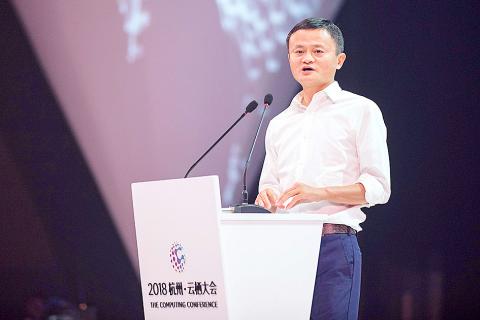Alibaba Group Holding Ltd (阿里巴巴) cofounder Jack Ma (馬雲) said his promise to create 1 million jobs in the US is impossible to fulfill because of the US-China trade war, a setback in one high-profile effort for deeper cooperation between the world’s two largest economies.
China’s richest man made the remarks in an interview with Xinhua news agency on Tuesday, saying the pledge made to US President Donald Trump is no longer feasible because of the unstable trade situation.
Ma and Trump met in January last year to discuss how adding small and medium-sized US businesses to Alibaba’s platform would boost employment.

Photo: AFP
Ma has grown increasingly critical of the trade battle between the US and China, saying it would damage businesses around the world.
In a speech on Tuesday, he cautioned China’s business and political leaders to prepare for the conflict to last 20 years, beyond the Trump presidency, as the two countries battle for economic supremacy.
“The [jobs] promise was made based on China and the US having a collaborative and friendly relationship,” he said in the Xinhua interview. “The situation now has completely destroyed our premise, so it can no longer be completed.”
Ma also said in the interview that he would keep making efforts to push for the healthy development of bilateral trade ties.
He said that trade is not a weapon and should not be used for wars.
Ma yesterday said that weakness in the economic outlook is “problematic” for the company.
“The economic outlook is not perfect of course, and it will last longer than people expect,” Ma said at the World Economic Forum in Tianjin, China. “If you look at the government conference papers, every year they say we have complex problems in the economy.”
Tensions have escalated this week as the US announced additional tariffs on about US$200 billion in Chinese goods, and Beijing responded with tariffs on about US$60 billion of US goods.
“Short term, business communities in China, US, Europe will all be in trouble,” Ma said on Tuesday, during a speech at Alibaba’s investor day in Hangzhou. “This thing will last long. If you want a short-term solution, there is no solution.”

Quanta Computer Inc (廣達) chairman Barry Lam (林百里) is expected to share his views about the artificial intelligence (AI) industry’s prospects during his speech at the company’s 37th anniversary ceremony, as AI servers have become a new growth engine for the equipment manufacturing service provider. Lam’s speech is much anticipated, as Quanta has risen as one of the world’s major AI server suppliers. The company reported a 30 percent year-on-year growth in consolidated revenue to NT$1.41 trillion (US$43.35 billion) last year, thanks to fast-growing demand for servers, especially those with AI capabilities. The company told investors in November last year that

Intel Corp has named Tasha Chuang (莊蓓瑜) to lead Intel Taiwan in a bid to reinforce relations between the company and its Taiwanese partners. The appointment of Chuang as general manager for Intel Taiwan takes effect on Thursday, the firm said in a statement yesterday. Chuang is to lead her team in Taiwan to pursue product development and sales growth in an effort to reinforce the company’s ties with its partners and clients, Intel said. Chuang was previously in charge of managing Intel’s ties with leading Taiwanese PC brand Asustek Computer Inc (華碩), which included helping Asustek strengthen its global businesses, the company

Taiwanese suppliers to Taiwan Semiconductor Manufacturing Co. (TSMC, 台積電) are expected to follow the contract chipmaker’s step to invest in the US, but their relocation may be seven to eight years away, Minister of Economic Affairs J.W. Kuo (郭智輝) said yesterday. When asked by opposition Chinese Nationalist Party (KMT) Legislator Niu Hsu-ting (牛煦庭) in the legislature about growing concerns that TSMC’s huge investments in the US will prompt its suppliers to follow suit, Kuo said based on the chipmaker’s current limited production volume, it is unlikely to lead its supply chain to go there for now. “Unless TSMC completes its planned six

TikTok abounds with viral videos accusing prestigious brands of secretly manufacturing luxury goods in China so they can be sold at cut prices. However, while these “revelations” are spurious, behind them lurks a well-oiled machine for selling counterfeit goods that is making the most of the confusion surrounding trade tariffs. Chinese content creators who portray themselves as workers or subcontractors in the luxury goods business claim that Beijing has lifted confidentiality clauses on local subcontractors as a way to respond to the huge hike in customs duties imposed on China by US President Donald Trump. They say this Chinese decision, of which Agence